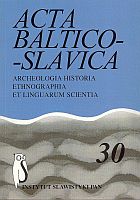Sposoby wyrażania grzeczności w korespondencji szlachty litewskiej (XIX-XX w.)
Ways of Expressing Politeness in the Lithuanian Nobility Correspondence (19th – 20th cent.)
Author(s): Anna Zielińska, Zofia Sawaniewska-MochowaSubject(s): Language and Literature Studies
Published by: Instytut Slawistyki Polskiej Akademii Nauk
Keywords: nobility; the Grand Duchy of Lithuania; linguistic etiquette; letters
Summary/Abstract: A letter as a linguistic statement, quite strongly conventionalized by means of its assignment to patterns and norms of social behaviour, is a valuable source helping in a description of linguistic etiquette in such a culturally divergent region of Europe as the Grand Duchy of Lithuania (today Lithuania and Belarus). Although now there is no such a formally distinguished social class as ‘traditional nobility’, in fact in the mentioned region still exists the group of people that identifies with the nobility culture. The paper deals with polite phrases used in the correspondence of the Lithuanian nobility in the nineteenth and twentieth centuries, especially with addressing expressions applied in inscriptions (addresses), salutations (welcoming) and subscriptions (conclusion, signature). We were interested mainly in two basic questions: 1. vitality of Old Polish politeness patterns and titles in researched letters (conservative elements in polite phrases), 2. evolution of politeness models that were shaped in the noble communities (innovative forms in polite phrases). Analyzed letters (133 texts and 55 addresses on the envelopes) were classified according to two criteria: relation sender-recipient and message’s content. We divided our material into two basic groups: private letters and official letters. In each of these groups letters are distinguished, paying attention to the relation sender-recipient, on the basis of character of partners: equal or unequal (because of diversity in terms of age, holding public office, social position and attractiveness, wealth). Considering communicative function, letters are divided into relating (sender presents recipient a story about different events) and illocutive (sender wants to reach intended aim). In fact, a lot of letters had mixed character (relations and information are accompanied by requests and thanks). Analysis of polite phrases in different types of letters proves that relation sender-recipient and letter’s content can wield big influence on the choice of adequate linguistic forms expressing politeness.
Journal: Acta Baltico Slavica
- Issue Year: 2006
- Issue No: 30
- Page Range: 199-220
- Page Count: 22
- Language: Polish

